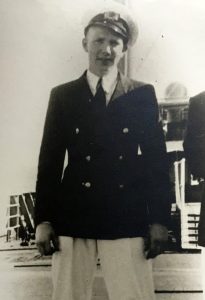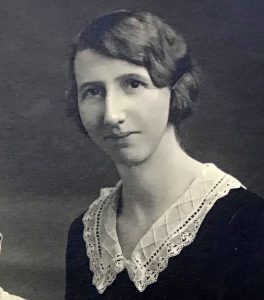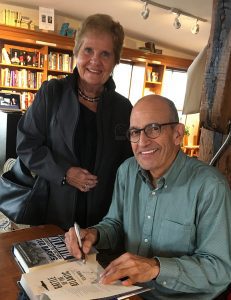
I wasn’t expecting to be surprised. This particular public-speaking event seemed straight forward. I’d arrived early and worked with the tech guy to get my presentation ready. I’d met with the bookseller to pre-inscribe some books. Then, I sat watching people file in. Then, a face registered, and her name tag – Jane Hutchison. She spotted me and came right over.
“Hi, Ted,” she said with a smile. “I’m John Dougall’s niece.”
“What are you doing here?” And I gave her a hug.
She said she was a longtime member of Canadian Club of Halton and heard that I’d been invited to speak about those who’d served at sea in the Battle of the Atlantic (the subject of my latest book). She said she didn’t want to miss this event, since the subject was near to her heart.
Jane and I met several years ago, when she found a batch of long-forgotten letters that her uncle, John Birnie Dougall, a wartime merchant sailor, had written to his mother in Cornwall while he served at sea during the Second World War.
“I’m sure these letters aren’t earth-shattering,” she said. “They’ve been tucked away in a big plastic bin, pretty much forgotten.”
By coincidence, the night before my talk to the Halton club, I’d inserted a section into my speech about the dedication of young merchant sailors during the war. How they’d repeatedly gone to sea transporting fuel, food and munitions to the U.K. despite the horrendous toll taken by German U-boats sinking merchant ship convoys on the North Atlantic.

During the war, if a man served in the merchant navy, he had a one-in-eight chance of being torpedoed and sunk – the highest casualty rate of any Canadian services (army, navy, air force, etc.) I’d used quotations from John Birnie Dougall’s letters home, the ones Jane had sent me.
“If I should (be sunk), don’t you fret,” Dougall had written his mother in 1941. “If I have to be splashing about in it, it is the way I would want to go, always living with the spirit of the sea.”
Dougall indeed had lost his life when his merchant ship, Gretavale, was torpedoed and sunk in November of that year. The happenstance meeting with Jane gave my speech in Halton all the more meaning for me and my audience.
This week, I’ve travelled through the Maritimes with appearances on the south shore of Nova Scotia, Halifax and Charlottetown. And the coincidences have continued. On Sunday, I travelled to one of the seaside town of LaHave River. The book store not only offered an extraordinary array of current titles, but every window in the place overlooked picture postcard views of the Atlantic.

During my presentation there, Bernice Hazzard suddenly appeared and threw her arms around me. I’d interviewed her husband, Howard Hazzard, wartime telegraphist aboard HMCS Huron, just before he died in London, Ont., in 2017. After he’d passed, Bernice had moved to Nova Scotia, just down the road from LaHave.
“Thank you for keeping the vets’ stories alive,” she said.
Then, on Monday night, I spoke at the Art Gallery of Nova Scotia in Halifax. In the audience unexpectedly included friends and former neighbours Celia Klemenz and John Frechette (recently moved from Clairmont), Bryan Fumerton (formerly of Uxbridge) and my wife’s cousin Judie MacSween.
We’d expected a larger audience that night, but since that was the day of Queen Elizabeth’s funeral (and consequently a stat holiday in Nova Scotia) attendance was limited. It didn’t matter to me. Coincidentally, with so many familiar faces, I felt right at home.
One of the flukes of working in media since the 1970s and teaching journalism for nearly 20 years means that sooner or later working journalists will often cross paths. Earlier this week, I rose pre-dawn on the south shore of Nova Scotia, travelled into Halifax (and into an incredible sunrise on the Atlantic).

I’d been invited to appear on the local CTV morning news/talk show broadcast across the Maritimes. There were the usual formalities of being met at the stage door of the studio, walking quietly through the on-air studio to the green room (where guests wait before going on air). I had arrived at the studio early, so I watched the program preceding my appearance.
The face of one of the women hosts clicked in my memory. The weathercaster looked familiar. When I arrived on the set for my interview, I was greeted by Lataevia Beezer. “I was so nervous when I heard you were coming on the show,” she said. “I was in your broadcasting class at Centennial College.”
Coincidence is great fun when mixed with pride.